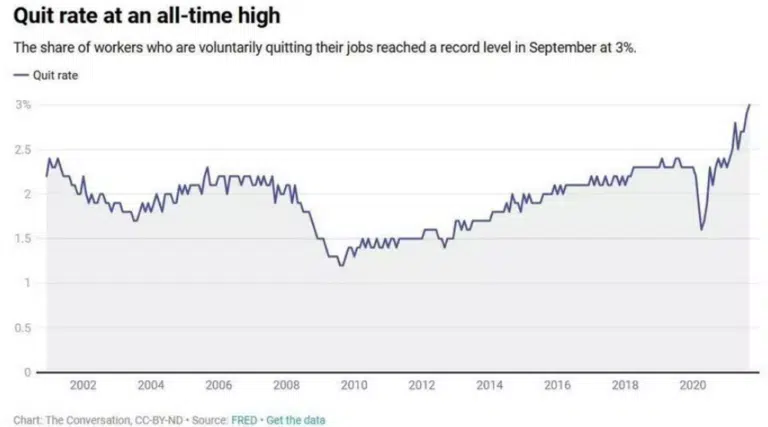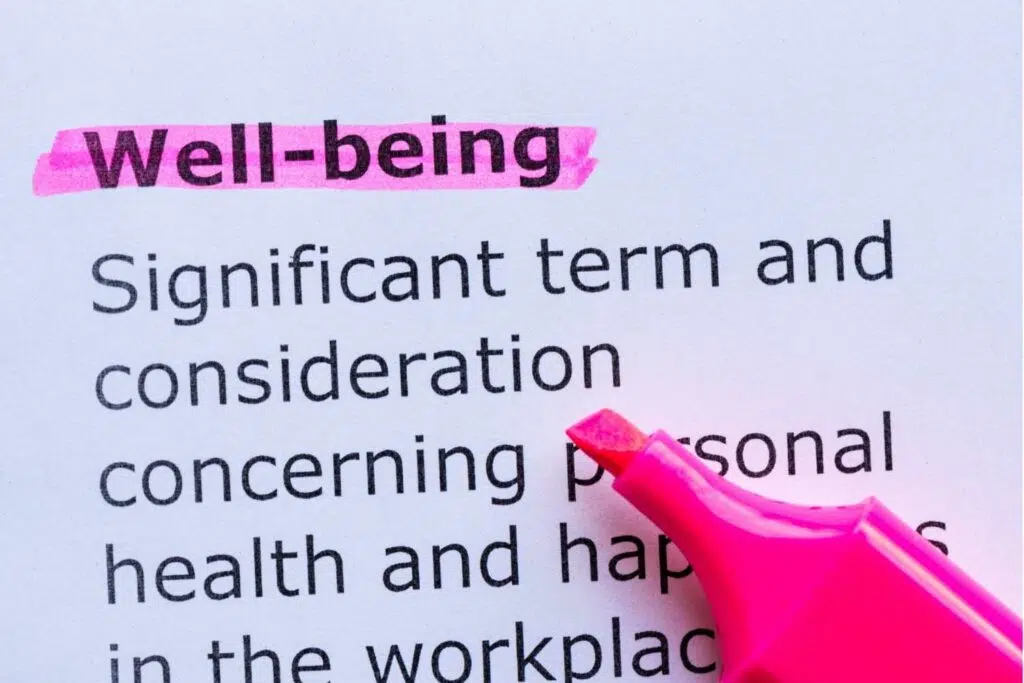
Revolutionising Energy Management in UK Businesses
In an era where sustainability is not just a buzzword but a business imperative, UK companies are increasingly turning to innovative solutions to manage their
What is happening in the world of work right now? Huge changes have happened over the last 2 ½ years, at such a pace that many still do not know what is happening. Long-standing traditions have been wiped away by the need to work from home and for some, there will never be a return to the office. Many thought that this phenomenon would be temporary and give it 6 months and it will all be back to normal. However, it does not appear to be happening this way.

So, are there a group of employees specifically choosing employers who focus and care about their health or, when all the talking is done, will people ultimately focus on their pay packet and future earning potential?
There have been several articles published in the media highlighting the phenomena of ‘The Great Resignation’. As the UK moved between lockdowns and people seemed to be in a never-ending cycle of working from home and then back into the office, news stories began to talk extensively about many people simply leaving their employers as they did not feel like they were put first. But was this related to health or did those who live in the Southeast no longer feel prepared to do the 3 hours of commuting once again, for a job they could easily do elsewhere or from home.
We have also gone through a time of un-precedented change when it comes to workers power. The jobs market is very much on the side of the employee currently making the ability to change roles much more in the power of talented employees, who know that their skills are hugely in demand. Therefore, there is no the risk to resigning that may have been previously perceived.
To get a better picture of what has been happening, let’s look at the stats.
This table shows the rise in workers quitting as we headed out of 2020 and into 2021. This aligns nicely with the narrative but there is more than meets the eye going on here.

“Industries with low location and time independence were among the industries that suffered most during the COVID pandemic work crisis. These are business models that are characterized by proximity of location and time, which implies that providers and receivers of a product or service are at the same place at the same time. These are businesses like dine in restaurants, ship cruises, sporting events, music concerts, passenger airlines, etc.
All these business models suffer severely from such a crisis due to the nature of their business model which has cascading effects on workers, their participation, motivation, and wellbeing. Services provided at a specific place, but where provider and receiver don’t need to be there at the same time have done slightly better.”
So, was this whole concept closely linked to job role rather than a cultural movement that inspired people to give up unfulfilling positions and move to where their heart took them? Not exactly!
The chances of people completely forgetting all about capitalism are very remote indeed. What they did do though was begin to seriously look at their life choices and the time spent away from family. They started questioning if it was worth it? When the answer came back as “no”, that’s when resignations started to increase.
What do the companies of the future and forward-thinking companies offer that benefit compared to more traditional workspaces?
Forward thinking, innovative companies have begun to prioritise their team’s mental health and wellbeing and have brought in new technology and processes to help them manage this.
Instead of the more traditional “dress down Fridays,” or “pops to the pub after work”, organisations are now integrating wellbeing programs into their employee timetables and are finding this to be extremely successful and beneficial all-round. This is the type of health initiative that employees are seeking. A company that proactively manages their wellbeing as part of the expected package.

While well-being programmes play a significant role in the workplace, there is much more that employers can do. Employees liked the way in which working from home enabled them to work in a familiar environment. They could benefit from their own comforts and a healthier environment but all of that can be replicated in the workplace.
A lot of research has been carried out on the workplace and how it impacts the way in which employees feel and therefore perform. They want a healthier environment with lots of natural light and space as well as a level of cleanliness that makes a difference. Their health and well-being are important to them, but a stuffy and unclean environment can prove stressful, all of which can lead to sick leave and a lack of productivity.
Therefore, it makes perfect sense to create the right working environment by working with us to help implement a solution that creates the perfect environment.
Let’s have a look at the work of academic study for their thoughts on this matter. Once again from the world economic forum:
Stewart Butterfield, the CEO of Slack, has a point in asking: “If we say that everyone must return to the office, or we expect people to, and one of our competitors says you can work remotely, who wouldn’t take the second option there?” We already know from surveys before the pandemic started that an overwhelming majority of knowledge workers would like to work from home and would even be willing to quit a job to work remotely. This is one of the major reasons for The Great Resignation. All these business models suffer severely from such a crisis due to the nature of their business model which has cascading effects on workers, their participation, motivation, and well-being. Services provided at a specific place, but where provider and receiver don’t need to be there at the same time have done slightly better.”
But what for those whose talents are traditionally not so much in demand, those in minimum wage or lower paying jobs whose skills are more transferable and therefore the roles themselves demand less of premium? They appear within the statistics for The Great Resignation as much as other areas of the job market. With the combined influence of Brexit, there is not enough labour at the entry level end of the market enabling those who are usually stuck in a role to choose to move should they wish.
Professor Dan Cable, Professor of Organisational Behaviour at London Business School, believes that we shouldn’t be too quick to rule out more personal reasons. He has suggested that the most confronting aspects of the pandemic have spurred a phase of post-traumatic growth.
“Normally, people are very keen to forget about their own impermanence. For obvious reasons, the pandemic has made that impossible. We have been confronted with the reality of our mortality.” All these business models suffer severely from such a crisis due to the nature of their business model which has cascading effects on workers, their participation, motivation, and well-being. Services provided at a specific place, but where provider and receiver don’t need to be there at the same time have done slightly better.”
This has forced people to think deeply about what they really want from life – including their careers.
“Thinking about death is scary, but it’s also extremely clarifying. People are asking themselves what their real values are. Why, when our time is so finite, would anyone want to spend their days doing something that doesn’t align with those values?”
This shows that employees are valuing their own mental health above many other areas of their lives which is a huge step forward.

Professor Gratton believes there are three things’ leaders can do to weather the storm of The Great Resignation:
1. Expect wanting a healthy and multi-stage way of working to be at the top of employees’ agendas. The thing most people treasure right now is flexibility. Flexibility about both where they work and when they work, flexibility to take time off to explore, flexibility to launch a small company or work for a not-for-profit.
2. Understand that is the beginning of the end for bad jobs. When unemployment is high people are often forced to settle for jobs with unsociable hours, low pay, no training and poor prospects. Right now, this isn’t the case. Talent is in high demand across many industries, meaning workers can enjoy more choice. If you’re not willing to make someone a quality offer, the chances are you’ll lose them to someone who is.
3. Keep an eye on what competitors are offering. Right now, we’re living through a period of huge experimentation. On one hand, many of the strategies we’re seeing businesses test right now could ultimately end up being reversed. On the other, if an industry leader adopts certain practices — particularly around flexibility — employees will be asking why their own companies are not adopting these opportunities. It will be critical to keep abreast of these experiments as they emerge and to consider which practices will help your organisation stand out.
I think however that CNBC have summarised this debate most comprehensively:
There’s no turning back from the workplace changes brought about by the Great Resignation, according to the expert who coined the term.
Organizational psychologist Anthony Klotz predicted in May 2021 that the Covid-19 pandemic would lead to pent-up resignations. Since that time, millions of Americans have quit their jobs; a record 4.5 million workers walked away in March alone.
The initial surge was due to the backlog of resignations since workers weren’t quitting during the height of the pandemic, he explained. They also were burned out, unhappy and re-evaluating their lives.
The ‘Great Resignation’ in UK shows that 20% of people are planning to quit soon! This is according to the CIPD.
www.cipd.co.uk/news-views/cipd-voice/Issue-33/great-resignation-fact-fiction#gref
When we look at the reason that people changed jobs, we can see that dismissals and redundancies were very prominent during the pandemic but have since declined – Figure 6. Resignations are now growing and stood at about 40% more (in absolute terms) than pre-pandemic. Could this be evidence of the great rethinking of priorities?
So, change is clearly upon us, you now have the choice, do you accept it and adapt your business to meet with this new challenge? Or will you push back to how things were previously with all of the potential risks to the robustness of your workforce that this entails?

In an era where sustainability is not just a buzzword but a business imperative, UK companies are increasingly turning to innovative solutions to manage their

In the dynamic world of work, it is crucial to adapt to emerging trends that shape the future of our workplaces. As we approach 2023,

Embracing Innovation with Envelo for Sustainable Business Operations In today’s business landscape, there has been a remarkable shift in the way organisations approach energy consumption.
Complete our survey below to see how your business performs.
Wanting to improve your workplace health and well-being, whilst reducing workplace sickness and improving productivity? Book a demonstration with one of our team today, and see how Envelo can monitor, manage and improve your workplace environment.
Envelo protects people from viruses and pollution and helps improve their wellbeing using prevention methods and app-driven monitoring technology.

Envelo Solutions Ltd (Company Number: 13100630)
Complete the form below to see Envelo’s smart technology platform in action. We’ll get back to you within 24 hours to schedule the best date and time to suit you.